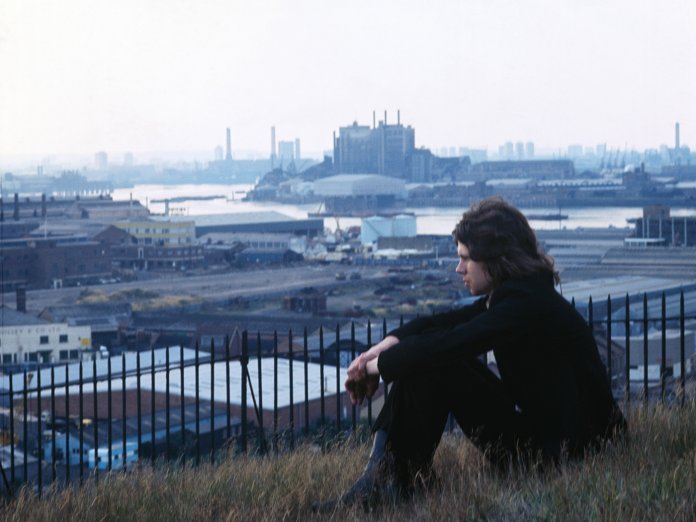Forty-eight years on from his untimely death, the tragic myth of Nick Drake persists. But there is another Nick Drake. In this extract from Uncut’s cover feature, we hear from his old friends about a spirited and untroubled young man on the cusp of a bright future. Read this and more in the latest issue of Uncut, available to buy here.
Set back from a busy modern street in Wandsworth, south London, are a row of terraced houses dating from 1710. Inside one of these, Jeremy Mason sits in a wood-panelled room, with bookcases lined with his vast Oscar Wilde collection and Chinese porcelain from his days as an oriental dealer. Mason is 74 – but as a teenager at Marlborough College and for a formative, dreamy season in Aix-en-Provence in the South of France, he was a friend of Nick Drake.
“Nick guided my musical tastes, and these are the records we listened to,” explains Mason as he opens the doors of an old, shelved cupboard to reveal the albums he and Drake heard at Marlborough. “This shows where we were coming from. Organ Grinder’s Swing, Jimmy Smith. We were rather keen on Astrud Gilberto. Charlie Parker, “Ornithology”. Miles Davis, Quiet Nights. Dylan, Dylan, Dylan. Have a look at this – Graham Bond Organisation, The Sound Of ’65. They were our heroes for a term or two.”
Mason then pulls out another sheaf of battered LPs. These are the original albums that he and Drake had shared when they were 18, living in an apartment in Aix. “There’s one of the ones I bought with him there – Adamo, Olympia 67. Typically French. ‘Inshallah’ was his great song. We listened to Johnny Hallyday, too. The Brandenburg Concertos. Here’s another record we shared – Segovia, Les Romantiques. We played the side-long ‘Sonata Romantica’ a lot in Aix. Nick listened with a guitar-player’s understanding.”
Drake is often viewed now through the prism of his final three years – when he retreated to Far Leys, his parents’ home in Tanworth-in-Arden, Warwickshire, as depression closed in, culminating in his fatal overdose on November 25, 1974 aged just 26. Taken with the delicate magic of his three studio albums – Five Leaves Left (1969), Bryter Layter (1971) and Pink Moon (1972) – Drake has become a romantic, desolate figure, seemingly crippled by failure and, in one of the biggest myths that has built up since his death, stage fright. But this wasn’t the boy his teenage friends remember. “Forget the doomed youth bit,” counsels Mason. “When I knew him, he was a perfectly normal English public schoolboy. We had a laugh. There was none of this angst. He couldn’t wait to perform for everybody.”
Rather than the diminished figure at the end of a short life, when he had all but stopped making music, Drake’s friends fondly remember him in the golden months between February and May 1967 when his songwriting first bloomed in Aix-en-Provence.
“Without Aix, it might not have happened for Nick,” says Simon Crocker, another Marlburian who travelled to France with him. “Aix was absolutely central to Nick becoming Nick Drake, if you like. I think it opened his eyes to a lot of things. It gave him a chance to hone his guitar skills, start to write songs, and think this was something he could do. We were all changed in Aix.”
“Aix was an enclave of 17- and 18-year-old students, running around, falling in love, and smoking whatever we had,” remembers Robin Frederick, a Californian singer-songwriter who met Drake there. “Nick had his friends with him. It was ideal.” During a dramatic detour to Morocco, he gained an audience with the Stones, even impressing Mick Jagger. “The fact that he went and played to the Stones suggests he had a certain amount of confidence,” argues Richard Charkin, who put him up to it.
“After Aix, Nick went helter-skelter straight into music,” says Mason. “But there was a period of a few months, where a new world took shape. It was innocent, without any thought of fame and fortune. It’s hovering in aspic, with the sun shining in the South of France, and Nick getting into playing music.”
“He was a very bright guy, who dressed like a slightly smart hobo,” says Crocker, reminiscing about his younger days with Drake. “He never hurried particularly. He took the time he needed and wanted to take. He was observant. He certainly had his own opinions, but he listened and chose his moment to talk. If there was something he disagreed with, he’d jump in and could be quite acerbic. But generally, he was a very nice, quite quiet, modest guy. We could have a laugh together, at the absurdities of life, and ourselves.”
“He was cool and introverted, but not as introverted as later on,” says Mason. “He was quite happy to join in almost everything. We went drinking in pubs when we shouldn’t have done, sneaking out through the back lanes … To his dying day, he spoke the Queen’s English in a public school manner. He sang that way, too. This is the culture Nick came from.”



